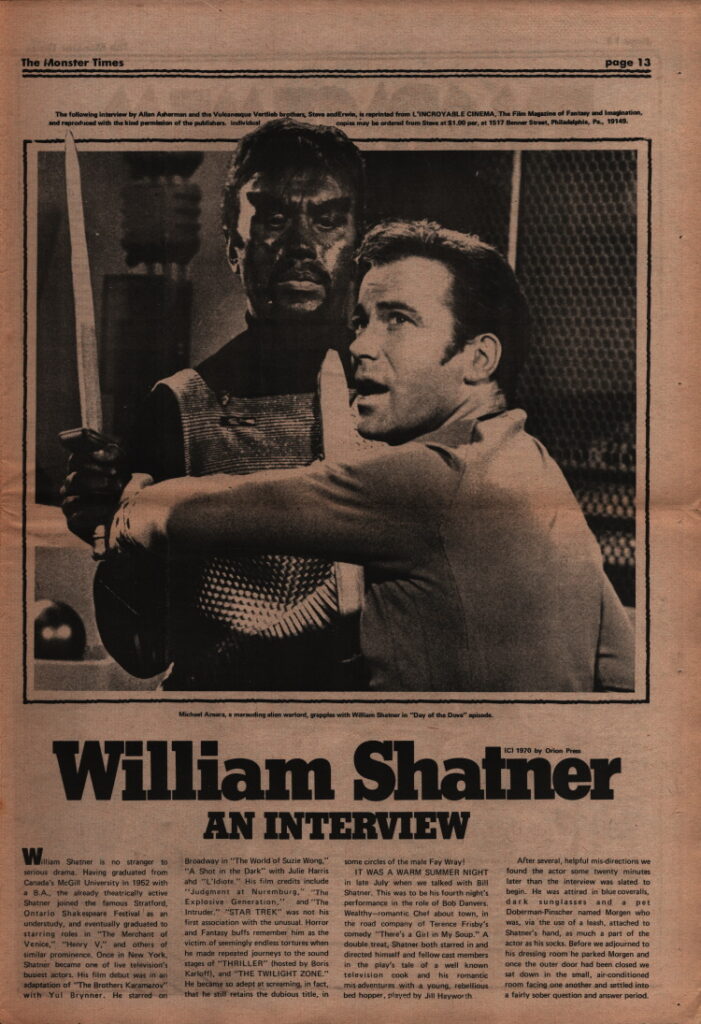
William Shatner is no stranger to serious drama. Having graduated from Canada’s McGill University in 1952 with a B.A., the already theatrically active Shatner joined the famous Stratford, Ontario Shakespeare Festival as an understudy, and eventually graduated to starring roles in “The Merchant of Venice,” “Henry V,” and others of similar prominence. Once in New York, Shatner became one of live television’s busiest actors. His film debut was in an adaptation of “The Brothers Karamazov” with Yul Brynner. He starred on Broadway in “The World of Suzie Wong,” “A Shot in the Dark” with Julie Harris and “L’Idiote.” His film credits include “Judgment at Nuremberg,” “The Explosive Generation,” and “The Intruder.” “STAR TREK” was not his first association with the unusual. Horror and Fantasy buffs remember him as the victim of seemingly endless tortures when he made repeated journeys to the sound stages of “THRILLER” (hosted by Boris Karloff), and “THE TWILIGHT ZONE.” He became so adept at screaming, in fact, that he still retains the dubious title, in some circles of the male Fay Wray!
IT WAS A WARM SUMMER NIGHT in late July when we talked with Bill Shatner. This was to be his fourth night’s performance in the role of Bob Danvers. Wealthy-romantic Chef about town, in the road company of Terence Frisby’s comedy “There’s a Girl in My Soup.” A double treat, Shatner both starred in and directed himself and fellow cast members in the play’s tale of a well-known television cook and his romantic misadventures with a young, rebellious bed hopper, played by Jill Hayworth
After several, helpful misdirections we found the actor some twenty minutes later than the interview was slated to begin. He was attired in blue coveralls, dark sunglasses and a pet Doberman-Pinscher named Morgen who was, via the use of a leash, attached to Shatner’s hand, as much a part of the actor as his socks. Before we adjourned to his dressing room he parked Morgen and once the outer door had been closed we sat down in the small, air-conditioned room facing one another and settled into a fairly sober question and answer period.
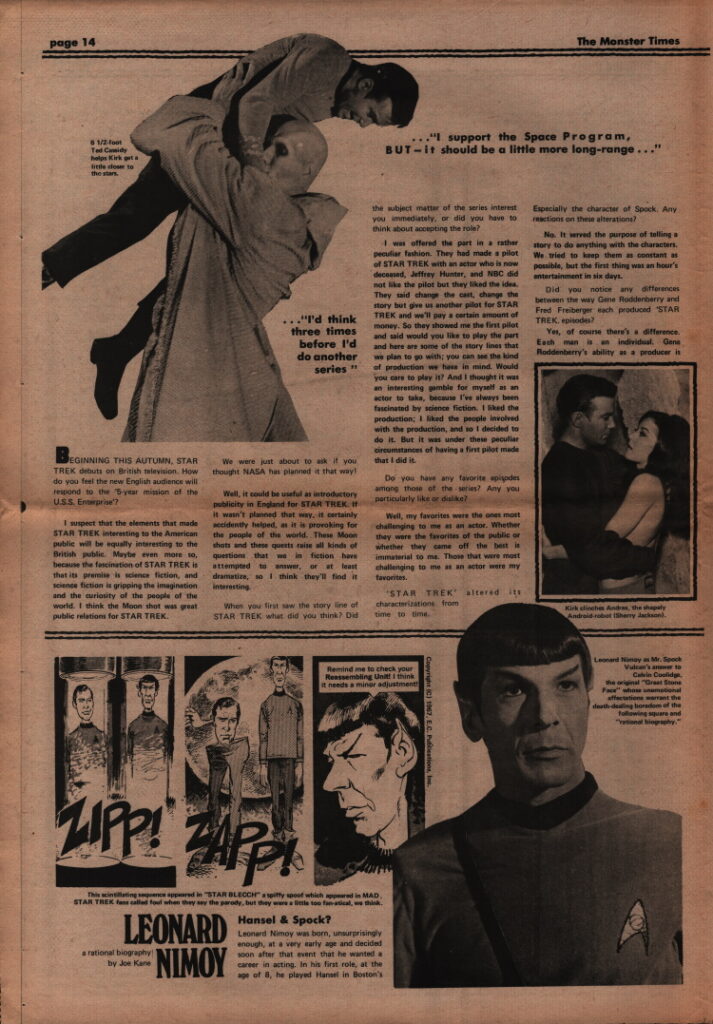
BEGINNING THIS AUTUMN, STAR TREK debuts on British television. How do you feel the new English audience will respond to the ‘5-year mission of the U.S.S. Enterprise’?
I suspect that the elements that made STAR TREK interesting to the American public will be equally interesting to the British public. Maybe even more so, because the fascination of STAR TREK is that its premise is science fiction, and science fiction is gripping the imagination and the curiosity of the people of the world. I think the Moon shot was great public relations for STAR TREK.
We were just about to ask if you thought NASA has planned it that way!
Well, it could be useful as introductory publicity in England for STAR TREK. If it wasn’t planned that way, it certainly accidentally helped, as it is provoking for the people of the world. These Moon shots and these quests raise all kinds of questions that we in fiction have attempted to answer, or at least dramatize, so I think they’ll find it interesting.
When you first saw the storyline of STAR TREK what did you think? Did the subject matter of the series interest you immediately, or did you have to think about accepting the role?
I was offered the part in a rather peculiar fashion. They had made a pilot of STAR TREK with an actor who is now deceased, Jeffrey Hunter, and NBC did not like the pilot but they liked the idea. They said change the cast, change the story but give us another pilot for STAR TREK and we’ll pay a certain amount of money. So they showed me the first pilot and said would you like to play the part and here are some of the storylines that we plan to go with; you can see the kind of production we have in mind. Would you care to play it? And I thought it was an interesting gamble for myself as an actor to take, because I’ve always been fascinated by science fiction. I liked the production; I liked the people involved with the production, and so I decided to do it. But it was under these peculiar circumstances of having a first pilot made that I did it.
Do you have any favorite episodes among those of the series? Any you particularly like or dislike?
Well, my favorites were the ones most challenging to me as an actor. Whether they were the favorites of the public or whether they came off the best is immaterial to me. Those that were most challenging to me as an actor were my favorites.
‘STAR TREK’ altered its characterizations from time to time.
Especially the character of Spock. Any reactions on these alterations?
No. It served the purpose of telling a story to do anything with the characters. We tried to keep them as constant as possible, but the first thing was an hour’s entertainment in six days.
Did you notice any differences between the way Gene Roddenberry and Fred Freiberger each produced ‘STAR TREK. episodes?
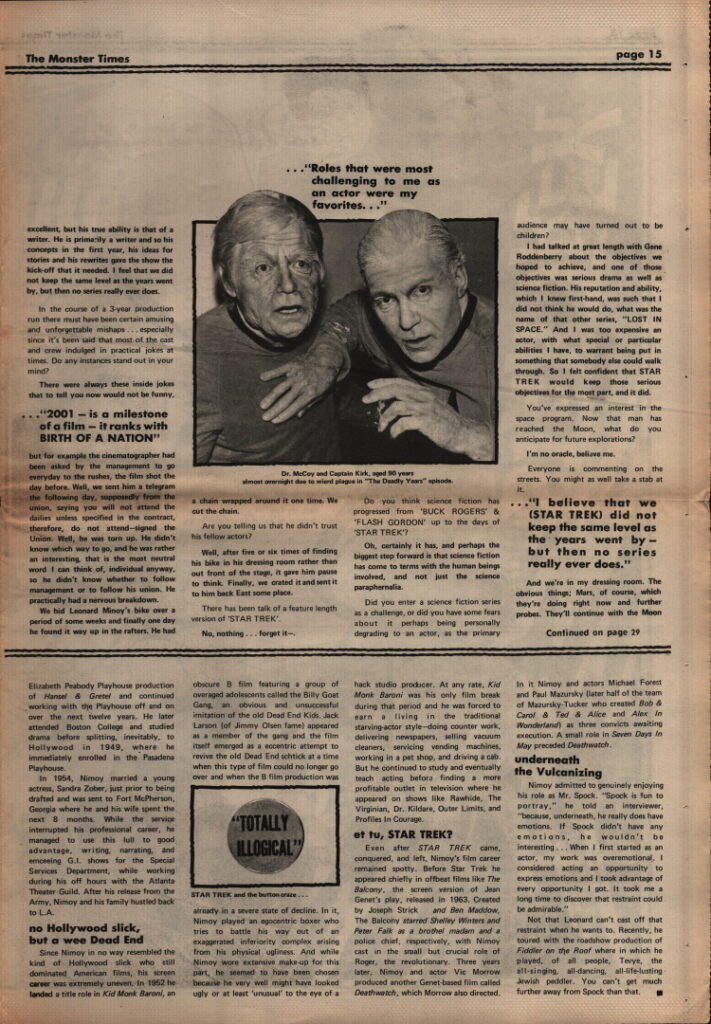
Yes, of course there’s a difference. Each man is an individual. Gene Roddenberry’s ability as a producer is excellent, but his true ability is that of a writer. He is primarily a writer and so his concepts in the first year, his ideas for stories and his rewrites gave the show the kick-off that it needed. I feel that we did not keep the same level as the years went by, but then no series really ever does.
In the course of a 3-year production run there must have been certain amusing and unforgettable mishaps … especially since it’s been said that most of the cast and crew indulged in practical jokes at times. Do any instances stand out in your mind?
There were always these inside jokes that to tell you now would not be funny,
…”2001 – is a milestone of a film – it ranks with BIRTH OF A NATION”
but for example the cinematographer had been asked by the management to go every day to the rushes, the film shot the day before. Well, we sent him a telegram the following day, supposedly from the union, saying you will not attend the dailies unless specified in the contract, therefore, do not attend-signed the Union. Well, he was torn up. He didn’t know which way to go, and he was rather an interesting, that is the most neutral word I can think of, individual anyway, so he didn’t know whether to follow management or to follow his union. He practically had a nervous breakdown.
We hid Leonard Minoy’s bike over a period of some weeks and finally one day he found it way up in the rafters. He had a chain wrapped around it one time. We cut the chain.
Are you telling us that he didn’t trust his fellow actors?
Well, after five or six times of finding his bike in his dressing room rather than out front of the stage, it gave him pause to think. Finally, we created it and sent it to him back East someplace.
There has been talk of a feature-length ‘STAR TREK’.
No, nothing … forget it-.
Do you think science fiction has progressed from ‘BUCK ROGERS’ & ‘FLASH GORDON’ up to the days of ‘STAR TREK’?
Oh, certainly it has, and perhaps the biggest step forward is that science fiction has come to terms with the human beings involved, and not just the science paraphernalia.
Did you enter a science fiction series as a challenge, or did you have some fears about it perhaps being personally degrading to an actor, as the primary audience may have turned out to be children?
I had talked at great length with Gene Roddenberry about the objectives we hoped to achieve, and one of those objectives was serious drama as well as science fiction. His reputation and ability, which I knew first-hand, was such that I did not think he would do, what was the name of that other series, “LOST IN SPACE.” And I was too expensive an actor, with what special or particular abilities I have, to warrant being put in something that somebody else could walkthrough. So I felt confident that STAR TREK would keep those serious objectives for the most part, and it did.
You’ve expressed an interest in the space program. Now that man has reached the Moon, what do you anticipate for future explorations?
I’m no oracle, believe me.
Everyone is commenting on the streets. You might as well take a stab at it.
…”I believe that we (STAR TREK) did not keep the same level as the years went by – but then no series really ever does.”
And we’re in my dressing room. The obvious things; Mars, of course, which they’re doing right now and further probes. They’ll continue with the Moon because it’s already been budgeted. They seem to be finding a lot of material which will make it economic to ship material to Earth. I think they’ll even probe the Sun when it’s possible.
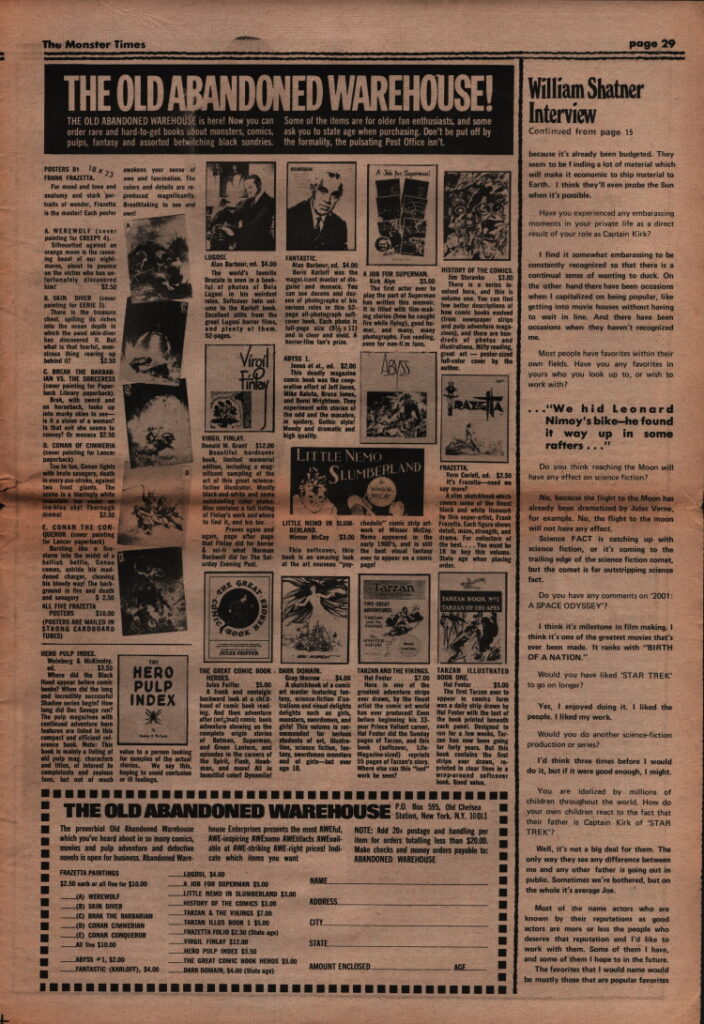
William Shatner Interview
Have you experienced any embarrassing moments in your private life as a direct result of your role as Captain Kirk?
I find it somewhat embarrassing to be constantly recognized so that there is a continual sense of wanting to duck. On the other hand there have been occasions when I capitalized on being popular, like getting into movie houses without having to wait in line. And there have been occasions when they haven’t recognized me.
Most people have favorites within their own fields. Have you any favorites in yours who you look up to, or wish to work with?
..”We hid Leonard Nimoy’s bike-he found it way up in some rafters …”
Do you think reaching the Moon will have any effect on science fiction?
No, because the flight to the Moon has already been dramatized by Jules Verne, for example. No, the flight to the moon will not have any effect.
Science FACT is catching up with science fiction, or it’s coming to the trailing edge of the science fiction comet, but the comet is far outstripping science fact.
Do you have any comments on ‘2001: A SPACE ODYSSEY’?
I think it’s milestone in filmmaking. I think it’s one of the greatest movies that’s ever been made. It ranks with “BIRTH OF A NATION.”
Would you have liked ‘STAR TREK’ to go on longer?
Yes, I enjoyed doing it. I liked the people. I liked my work.
Would you do another science-fiction production or series?
I’d think three times before I would do it, but if it were good enough, I might.
You are idolized by millions of children throughout the world. How do your own children react to the fact that their father is Captain Kirk of ‘STAR TREK’?
Well, it’s not a big deal for them. The only way they see any difference between me and any other father is going out in public. Sometimes we’re bothered, but on the whole it’s average Joe.
Most of the name actors who are known by their reputations as good actors are more or less the people who deserve that reputation and I’d like to work with them. Some of them I have, and some of them I hope to in the future.
The favorites that I would name would be mostly those that are popular favorites like Burton, and Olivier-of that ilk. These would be the kind of people I’d like to work with.
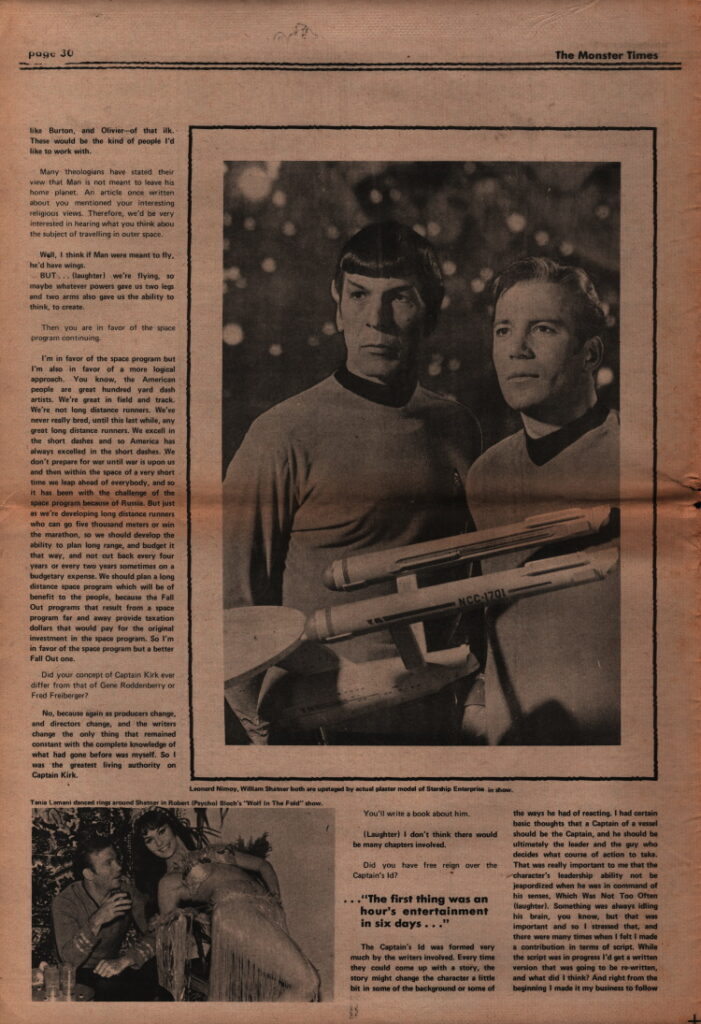
Many theologians have stated their view that Man is not meant to leave his home planet. An article once written about you mentioned your interesting religious views. Therefore, we’d be very interested in hearing what you think about the subject of traveling in outer space.
Well, I think if Man were meant to fly, he’d have wings.
BUT… (laughter) we’re flying, so maybe whatever powers gave us two legs and two arms also gave us the ability to think, to create.
Then you are in favor of the space program continuing.
I’m in favor of the space program but I’m also in favor of a more logical approach. You know, the American people are great hundred-yard dash artists. We’re great in field and track. We’re not long-distance runners. We’ve never really bred, until this last while, any great long-distance runners. We excel in the short dashes and so America has always excelled in the short dashes. We don’t prepare for war until war is upon us and then within the space of a very short time we leap ahead of everybody, and so it has been with the challenge of the space program because of Russia. But just as we’re developing long-distance runners who can go five thousand meters or win the marathon, so we should develop the ability to plan long range, and budget it that way, and not cut back every four years or every two years sometimes on a budgetary expense. We should plan a long-distance space program which will be of benefit to the people, because the Fall Out programs that result from a space program far and away provide taxation dollars that would pay for the original investment in the space program. So I’m in favor of the space program but a better Fall Out one.
Did your concept of Captain Kirk ever differ from that of Gene Roddenberry or Fred Freiberger?
No, because again as producers change, and directors change, and the writers change the only thing that remained constant with the complete knowledge of what had gone before was myself. So I was the greatest living authority on Captain Kirk.
You’ll write a book about him.
(Laughter) I don’t think there would be many chapters involved.
Did you have free reign over the Captain’s Id?
…”The first thing was an hour’s entertainment in six days …”
The Captain’s Id was formed very much by the writers involved. Every time they could come up with a story, the story might change the character a little bit in some of the background or some of the ways he had of reacting. I had certain basic thoughts that a Captain of a vessel should be the Captain, and he should be ultimately the leader and the guy who decides what course of action to take. That was really important to me that the character’s leadership ability not be jeopardized when he was in command of his senses, Which Was Not Too Often (laughter). Something was always idling his brain, you know, but that was important and so I stressed that, and there were many times when I felt I made a contribution in terms of script. While the script was in progress I’d get a written version that was going to be re-written, and what did I think? And right from the beginning I made it my business to follow the scripts and follow the storylines, and suggest interesting turns of events, or how to approach things. And I was listened to.
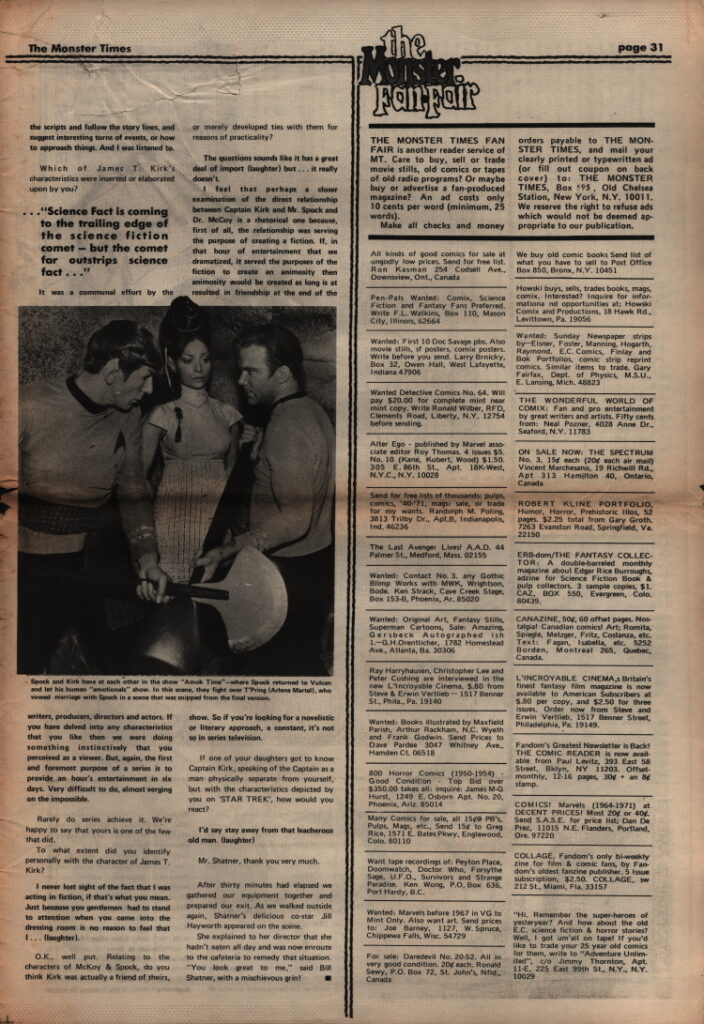
Which of James T. Kirk’s characteristics were inserted or elaborated upon by you?
…”Science Fact is coming to the trailing edge of the science fiction comet – but the comet far outstrips science fact…”
It was a communal effort by the writers, producers, directors and actors. If you have delved into any characteristics that you like then we were doing something instinctively that you perceived as a viewer. But, again, the first and foremost purpose of a series is to provide an hour’s entertainment in six days. Very difficult to do, almost verging on the impossible.
Rarely do series achieve it. We’re happy to say that yours is one of the few that did.
To what extent did you identify personally with the character of James T. Kirk?
I never lost sight of the fact that I was acting in fiction, if that’s what you mean. Just because you gentlemen had to stand to attention when you came into the dressing room is no reason to feel that 1… (laughter).
O.K., well put. Relating to the characters of Mckoy & Spock, do you think Kirk was actually a friend of theirs, or merely developed ties with them for reasons of practicality?
The questions sounds like it has a great deal of import (laughter) but … it really doesn’t.
I feel that perhaps a closer examination of the direct relationship between Captain Kirk and Mr. Spock and Dr. McCoy is a rhetorical one because, first of all, the relationship was serving the purpose of creating a fiction. If, in that hour of entertainment that we dramatized, it served the purposes of the fiction to create an animosity then animosity would be created as long is at resulted in friendship at the end of the show. So if you’re looking for a novelistic or literary approach, a constant, it’s not so in series television.
If one of your daughters got to know Captain Kirk, speaking of the Captain as a man physically separate from yourself, but with the characteristics depicted by you on ‘STAR TREK’, how would you react?
I’d say stay away from that lecherous old man. (laughter)
Mr. Shatner, thank you very much.
After thirty minutes had elapsed we gathered our equipment together and prepared our exit. As we walked outside again, Shatner’s delicious co-star Jill Hayworth appeared on the scene.
She explained to her director that she hadn’t eaten all day and was now en route to the cafeteria to remedy that situation. “You look great to me,” said Bill Shatner, with a mischievous grin!
